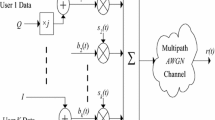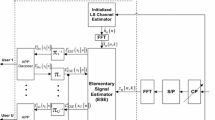Abstract
In this paper, we present a robust adaptive channel estimator and a robust multiuser detector for wireless multicarrier code-division multiple access (MC–CDMA) systems under narrowband interference (NBI). The conventional least-squares (LS) channel estimator performs poorly when narrowband interfering signals contaminate the multicarrier systems. A new weighted recursive least M-estimate (WRLM) channel estimator is hence developed to estimate multipath fading channels in the presence of NBI. The new robust channel estimator resorts to M-estimate and weighted least-squares (WLS) techniques. Simulations show that the WRLM channel estimator offers substantial performance gain over conventional recursive least-squares (RLS), recursive least M-estimate (RLM) and weighted RLS (WRLS) channel estimators under NBI. With the estimated channel coefficients, a robust multiuser detector is proposed to jointly suppress multiple access interference (MAI) and NBI. The performance of the linear decorrelator will degrade substantially in the presence of NBI. A weighted least M-estimate (WLM) algorithm is therefore developed to combat the NBI. The WLM multiuser detector is also based on the weighted M-estimate concept. Numerical results show that the proposed WLM multiuser detector significantly outperforms over the conventional linear decorrelator, the robust decorrelator with M-estimate and the WLS detector under NBI.
Similar content being viewed by others
References
N. Yee, J. P. Linnartz, and G. Fettweis, “Multicarrier CDMA in indoor wireless radio networks,” Proc. IEEE Int. Symp. PIMRC, vol. 1, 1993, pp. 109–133.
S. Hara and R. Prasad, “Overview of multicarrier CDMA,” IEEE Commun. Magazine, vol. 35, Dec. 1997, pp. 126–133.
S. Hara and R. Prasad, “Design and performance of Multicarrier CDMA system in frequency-selective Rayleigh dading channels,” IEEE Trans. Veh. Technol., vol. 48, 1999, pp. 1584–1599.
E. A Sourour and M. Nakagawa, “Performance of orthogonal multicarrier CDMA in a multipath fading channel,” IEEE Trans. Commun., vol. 44, 1996, pp. 356–367.
X. Gui and T. S. Ng, “Performance of asynchronous orthogonal multicarrier CDMA system in frequency selective fading channel,” IEEE Trans. Commun., vol. 47, 1999, pp. 1084–1091.
S. L. Miller and B. J. Rainbolt, “MMSE detection of multicarrier CDMA,” IEEE J. Select. Areas Commun., vol. 18, 2000, pp. 2356–2362.
D. N. Kalofonos, M. Stojanovic, and J. G. Proakis, “Performance of adaptive MC-CDMA detectors in rapidly fading Rayleigh channels,” IEEE Trans. Wireless Commun., vol. 2, March. 2003, pp. 229–239.
O. Edfors, M. Sandell, J.-J. van den Beek, S. Wilson, and P. Borjesson, “OFDM channel estimation by singular value decomposition,” IEEE Trans. Commun., vol. 46, April 1998, pp. 931–939.
Y. Li, “Pillot-symbol-aided channel estimation for OFDM in wireless systems,” IEEE Trans. Veh. Technol., vol. 49, 2000, pp. 1207–1215.
S. Verdu, Multiuser Detection, Cambridge Univ. Press, Cambridge UK, 1998.
P. L, Kafle and A. B. Sesay, “Iterative semi-blind multiuser detection for turbo-coded MC–CDMA system with space–time transmit diversity,” Proc. IEEE Military Communications Conference, vol. 2, Oct. 2002, pp. 1039–1043.
J. G. Andrews and T. H. Y. Meng, “Performance of multicarrier CDMA with successive interference cancellation in a multipath fading channel,” IEEE Trans. Commun., vol. 52, May 2004, pp. 811–822.
A. J. Redferm, “Receiver window design for multicarrier communication systems,” IEEE J. Sel. Areas Commun., vol. 20, no. 5, June 2002, pp. 1029–1036.
R. Nilsson, F. Sjoberg, and J. P. Leblanc, “A rank-reduced LMMSE canceller for narrowband interference suppression in OFDM-based systems,” IEEE Trans. Commun., vol. 51, no. 12, 2003, pp. 2126–2140.
D. Zhang, P. Fan, and Z. G. Cao, “A novel narrowband interference canceller for OFDM systems,” Proceedings of Wireless Communications and Networking Conference, 2004, pp. 1426–1430.
A. J. Coulson, “Narrowband interference in pilot symbol assisted OFDM systems,” IEEE Trans. Wireless Commun., vol. 3, no. 6, Dec. 2004, pp. 2277–2287.
R. S. Wang and H. B. Li, “Robust channel estimation and detection for multi-carrier CDMA,” Proceedings of Asilomar Conference on Signals, Systems, and Computers, Nov. 2004, pp. 898–902.
D. Darsena, G. Gelli, L. Paura, and F. Verde, “Widely linear equalization and blind channel indentification for interference-contaminated multicarrier systems,” IEEE Trans. Signal Process., vol. 53, no. 3, 2005, pp. 1163–1177.
D. Gerakoulis and P. Salmi, “An interference suppressing OFDM system for wireless communications,” Proceedings of the International Conference on Communications, Apr. 2002, pp. 480–484.
Z. Q. Wu, C. R. Nassar, and X. Y. Xie, “Narrowband interference rejection in OFDM via carrier interferometry spreading codes,” Proc. Globecom, 2004, pp. 2387–2392.
S. M. Kay, Fundamentals of Statistical Signal Processing: Estimation Theory, PTR Prentice-Hall, New Jersey, 1993.
P. J. Huber, Robust Statistics, Wiley, New York, 1973.
Y. X. Zou, S. C. Chan, and T. S. Ng, “Least mean M-estimate algorithms for robust adaptive filtering in impulse noise,” IEEE Trans. Circuits Syst. II, vol. 47, no. 12, 2000, pp. 1564–1569.
S. C. Chan and Y. X. Zou, “A recursive least M-estimate algorithm for robust adaptive filtering in impulsive noise: fast algorithm and convergence performance analysis,” IEEE Trans. Signal Process., vol. 52, no. 4, 2004, pp. 975–991.
X. D. Wang and H. V. Poor, “Robust multiuser detection in non-Gaussian channels,” IEEE Trans. Commun., vol. 47, no. 2, 1999, pp. 289–305.
J. G. Proakis, Digital Communications, McGraw-Hill, New York, 2000.
M. Morelli and U. Mengali, “A comparison of pilot-aided channel estimation methods for OFDM systems,” IEEE Trans. Signal Process., vol. 49, Dec. 2001, pp. 3065–3073.
S. Haykin, Adaptive Filter Theory, Prentice-Hall, New Jersey, 2000.
W. C. Jakes, Microwave Mobile Communication, Wiley, New York, 1974.
Author information
Authors and Affiliations
Corresponding author
Rights and permissions
About this article
Cite this article
Cheng, H., Chan, S.C. & Zhang, Z.G. Robust Channel Estimation and Multiuser Detection for MC–CDMA Systems Under Narrowband Interference. J Sign Process Syst Sign Image Video Technol 52, 165–180 (2008). https://doi.org/10.1007/s11265-007-0145-7
Received:
Accepted:
Published:
Issue Date:
DOI: https://doi.org/10.1007/s11265-007-0145-7




